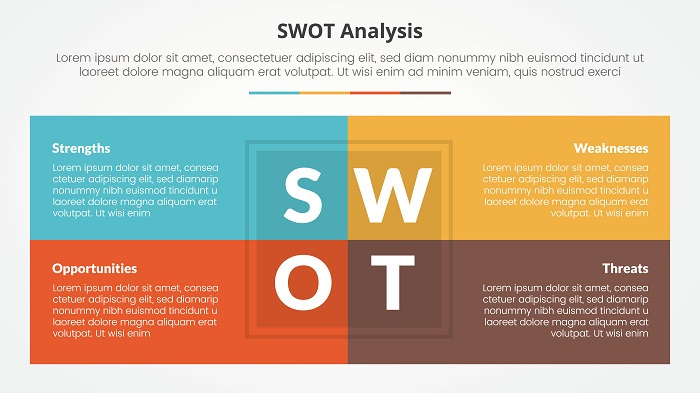SWOT analysis is a simple, widely used, and reliable tool, which can lead to a better understanding of the business environment and strategic decisions. SWOT allows you to identify the strengths and weaknesses of your corporate structure, and translate them into opportunities while targeting external threats to the business. Many roles in the UK job market require skill in SWOT analysis, in particular. The following are examples of such projects where skills in SWOT analysis are essential.
The importance of SWOT analysis in UK jobs
Business Analyst: In the UK job market, leveraging a SWOT analysis template is essential for evaluating strengths, weaknesses, opportunities, and threats. This strategic approach guides decision-making, as evidenced by a significant majority of UK companies—around 75%—integrating SWOT analyses into their strategic frameworks. It empowers businesses to allocate resources wisely and navigate challenges proactively in today’s competitive environment.
Marketing managers
Marketing managers use SWOT analysis to formulate their strategies by understanding the market and their own capabilities. They identify strengths such as a strong brand, address weaknesses such as limited reach, seize opportunities in new markets, and defend against threats such as new competitors and this ensures their marketing efforts consistent with company objectives.
Project managers
SWOT analysis is used to analyze project plans and identify potential risks and opportunities, to ensure project success. Project managers use SWOT analysis to ensure project success. By assessing the team’s strengths and budget constraints, challenges can be met effectively. New technologies can be used as opportunities and plans for potential risks such as supply chain issues. This approach helps businesses stay relevant.
Planning
SWOT analysis aids in planning by identifying strengths and weaknesses, enabling strategic development for market expansion, and addressing threats like regulatory changes for long-term success.
Entrepreneurs and small business owners
Entrepreneurs and small business owners use SWOT analysis to understand their position and improve performance. By looking for strengths such as loyal customers and weaknesses such as limited funds, they can look for opportunities in different markets and prepare for threats from larger competitors. This helps them plan effectively for growth and sustainability.
Use of SWOT analysis template
For those who want to develop their SWOT analysis skills, using the SWOT analysis template is a useful starting point. These theories provide a structured framework for systematically assessing different aspects of an entrepreneurial or individual career path
SWOT a dynamic tool
Today’s markets are incredibly complex and susceptible to change. Markets are based not only on simple relationships between consumers and products but also on popular culture, political sentiment, endorsements, and branding.
In such a dynamic environment, SWOT cannot be a one-off analysis. This should be an ongoing process for better decision-making. Opportunities for SWOT include time for strategic analysis and planning; how competitors react to new product launches; evaluating and seize opportunities to compete within the sector; testing the feasibility of each alternative design and so on.
Best practices in applied SWOT analysis
- A SWOT analysis must be practical and quantifiable, in order to find actionable solutions.
- Take the time to do listings in order as needed. So you can spend more time on more important things.
- Ensure that the selected methods developed are carried over later in the configuration process.
- Use appropriate levels – for example; SWOT should be applied at the product or product level, not the more vague level of the entire company.
- SWOT analysis along with other planning tools like PEST, MOST, and Porter’s 5 Forces provides a comprehensive picture of the business situation at any particular point in time.
- Use verifiable and quantifiable data. (“It costs a profit of $10/Kg to get x from raw materials”, not “good value for money”).
Conclusion
Effective marketing is always built on a rock-solid foundation of introspection and analysis. Markets today are dynamic and changing rapidly, and the only rule that follows is “Survival of The Fittest”. So it’s the companies that can identify and adapt to new opportunities that win, while those stuck on the margins lose out. In order to understand ever-changing market dynamics, companies use several important business analysis techniques, which help them develop actionable strategic plans One of the cornerstones of this collection of techniques and SWOT Analysis.
Thus including Swot analysis in your skill set can significantly increase your productivity in the UK industry. Whether you are a business analyst, marketing manager, project manager, strategist, or consultant, getting this tool right can give you a strategic advantage. Start by using the SWOT analysis process to better identify the strategy and hone your analytical capabilities.




